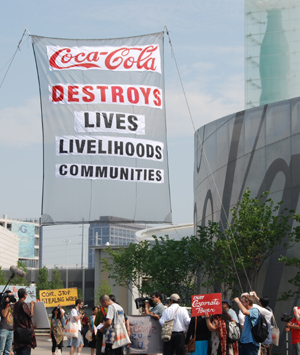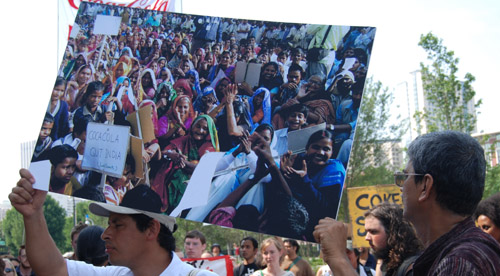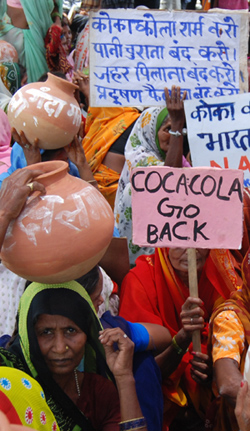|
|
|
Home--Campaigns--Coca-Cola
Coca-Cola Forced to Announce Ambitious Water Conservation Plans
By Amit Srivastava
India Resource Center
July 11, 2007
On June 30, the India Resource Center organized a protest at the brand
new Coca-Cola's museum in Atlanta - the World of Coke.

Banner at Coca-Cola Museum Photo: A. Samulon/India Resource Center
|
|
Why Coca-Cola? Because the company is guilty of creating severe water
shortages and pollution around its bottling plants all across India.
Communities around Coca-Cola's bottling plants are left without water
for drinking, cooking and farming, and also with polluted land and
water.
It was very fitting that we converged upon the Coca-Cola museum, a
world of make-believe set up by the company to assure itself and its
consumers that its products 'refreshes' everyone it touches.
The reality, as thousands of people in India know it, is very different.
We went to Coca-Cola's museum with a large picture of women protesting
against the company's bottling plant in Mehdiganj in India in the scorching heat in May. We wanted the Coca-Cola company
to include the picture of the protesters against its operations
in India in the museum, to help the Coca-Cola museum get closer to
the 'real thing.'
Company officials, in typical fashion, chose not to accept our contribution
to the museum, opting instead to continue with a very well manufactured,
glossy representation of the Coke side of life.
Such is the Coke side of life. We call it greenwashing.
Growing Campaign
The international campaign to hold Coca-Cola accountable for its crimes
in India is growing, and it has never been stronger. Over 25 colleges
and universities in the US, UK and Canada have removed Coca-Cola products
from their campuses as a result of the campaign. Just in the last
six months, Manchester University in the UK, the University of Guelph
in Canada and Smith College in the US have taken actions to remove
Coca-Cola from campus.
The Coca-Cola company has also been dropped from the prestigious $8
billion TIAA-CREF Social Choice Account fund because of the company's
questionable environmental practices in India. TIAA-CREF is one of
the largest financial services companies in the United States, with
over $380 billion in assets.
The campaign has been characterized by the Wall Street Journal as
having cost the Coca-Cola company " millions of dollars in lost sales
and legal fees in India, and growing damage to its reputation elsewhere."
The international campaign has put the Coca-Cola company of the defensive,
even leading Neville Isdell, their CEO, to publicly state that "mistakes
have been made in India."

Coke Protest Picture for Museum Photo: A. Samulon/India Resource Center
|
|
The increasing pressure has forced the Coca-Cola to do some serious
rethinking about the way in which they deal with the growing crisis
in India. The company has opted, to our disappointment, to engage
further in a public relations drive, hoping that the issues in India
will somehow go away.
Campaign Forces Coca-Cola's Ambitious Plans
Last month, the Coca-Cola company announced, to much fanfare, a three-year,
US$20 million partnership with the World Wildlife Fund (WWF) to "conserve
and protect freshwater resources."
The partnership with the WWF comes directly as a response to the growing
campaign against Coca-Cola for abusing water resources in India.
At face value, such an announcement is obviously welcome. After all,
who would object to water conservation projects in a world where over
1 billion people still lack access to clean drinking water?
But the announcement by Coca-Cola deserves scrutiny - something sorely
lacking from the media and even NGO's - primarily because it is the
Coca-Cola company that is announcing water conservation projects.
We suspect that the announcement is an attempt to deflect the growing
criticism of its operations in India.
The Coca-Cola company claims that it will be "returning all water
that it uses for manufacturing processes to the environment" by 2010.
Is this wishful thinking?
Unsustainable Relationship with Water
As the India Resource Center has established, the Coca-Cola company
has an extremely unsustainable relationship with water, a precious
and increasingly scarce natural resource.
The company's insatiable thirst for water - the company used 290 billion
liters of water in 2006 alone, enough to meet the entire world's drinking
water needs for 10 days - does not even begin to tell the whole story.
The Coca-Cola company converted two-thirds of the freshwater it used
into wastewater. The company used the vast majority of the freshwater
it uses for cleaning in its production process, and the result is
that the Coca-Cola company is a champion of turning perfectly fine
(and increasingly scarce) freshwater into wastewater.

Protest Against Coca-Cola in Mehdiganj, May 2007 Photo: A. Srivastava/India Resource Center
|
|
Such an abusive relationship with water is downright criminal, particularly
coming from a company that describes itself as a "hydration" company
and whose annual environmental report reads like a grant proposal
from a group working solely on water conservation.
In India, where the company claims to return a "substantial" portion
of the water they use back to the environment, the company has no
numbers to back it up. When challenged, one of their managers
provided numbers that amounted to 8% of the water being returned to
the environment. Substantial? Hardly. But does it sound good? Definitely.
Ignoring India
For the communities in India struggling against Coca-Cola's misuse
of water resources, however, the announcement of the $20 million partnership
with WWF falls way short of what is required of the Coca-Cola company.
First and foremost, the Coca-Cola company must adopt fundamental operational
changes in the manner in which it operates in India. So far, the company
has chosen to respond to the charges in India through its formidable
public relations machinery, and no amount of "spin" will make the
problems go away.
Secondly, the partnership with the World Wildlife Fund,
ostensibly to conserve and protect freshwater, does not include India.
While many are grateful that India is excluded from their list, it
is also befuddling that the company has chosen to ignore the country
where it has arguably done the most harm to water resources.
A Drop in the Bucket
For a company that has an annual advertising budget of $2.4 billion,
an investment of $20 million in a global water conservation project
- less than 1% of its advertising budget alone - is truly a drop in
the bucket.
In fact, it would not be unrealistic to wager that the Coca-Cola company
will spend more on advertising its water conservation efforts than
on the water conservation projects itself!
And for a company with a market capitalization of $100 billion, the
sincerity of Coca-Cola's investment in water conservation becomes
even clearer. The company is investing a meager 0.002% of what it
is worth to conserve water.

Water is Life or Coke's Greenwash? Photo: A. Samulon/India Resource Center
|
|
Given the Coca-Cola company's past record of manufacturing an image
of itself that it clearly is not, we remain extremely skeptical that
the current announcement to conserve water is anything else than another
attempt to do just that - greenwash.
The Macmillan English Dictionary defines greenwash
as:
"to try to convince people that you are doing something
which is good for the environment by being involved in small, environmentally-friendly
initiatives, especially as a way of hiding your involvement in activities
which are damaging to the environment."
In India, where Coca-Cola wastes even more water than their global
average, the company has announced separately that it will have a
'Net Zero' water balance by 2009.
We will be keeping a close eye on Coca-Cola's stated goals and achievements.
It is, after all, the international campaign that has forced the Coca-Cola
company to announce such ambitious plans. Perhaps the campaign's scrutiny
on their stated objectives will force the company to actually make good on their committments and make the necessary
changes?
Are we now engaging in wishful thinking? We hope not. Too many lives and livelihoods are at stake.
Amit Srivastava is the coordinator of India Resource Center <www.IndiaResource.org>,
a central organization in the international campaign to hold the Coca-Cola
company accountable for its abuses in India.
|
|


PRESS: Coca-Cola Forced to Abandon $25 Million Project in India
PRESS: Coca-Cola Expansion Plans Rejected
PRESS: Coca-Cola Plant Shut Down in India, Authorities Cancel License
STUDY: Coca-Cola’s Operations in India Lead to “Tragedy of the Commons”
PRESS: 15 Village Councils Reject Coca-Cola Plans as Opposition Grows
Mehdiganj - The Issues
PRESS: Coca-Cola Expansion Plan Opposed in Mehdiganj, India
Support Us
Join Us
>> More
Stories

|

![]()



